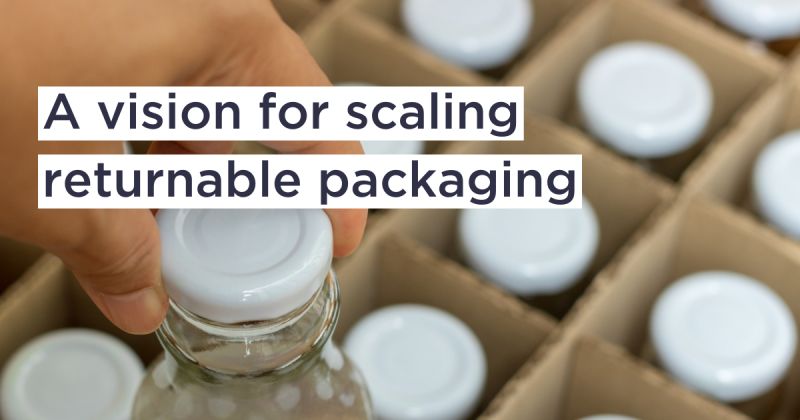
The work being carried out by the Plastics Initiative uses future visualisation and analytical modelling to show how scaled reuse systems can perform economically, environmentally, and experientially in comparison to single-use.
To ultimately decouple plastic use from business growth, we need scalable solutions that don’t require single-use packaging to deliver products to users. Ambitious reuse policies are increasing, but the road to scaling reuse from niche to norm is still hard to imagine.
Many refill and ‘returnable’ packaging pilots are offering promise, but they show that no one organisation can do this alone - either economically or in creating a compelling customer experience. While pilots are crucial, now is the time for system design at scale to catalyse action towards building the returnable system of the future.
To unlock economies of scale that can compete with single use, the Ellen MacArthur Foundation sees an urgent need for a common vision for returnable packaging, an aligned understanding, better data, and a common voice to policymakers.
The conclusions of this work will be finalised over the coming months and the full modelling results will be published with a thorough technical appendix later this year.
Supporting the development of this shared vision, cross-sector partners are sharing their learnings and working collaboratively to explore what can be possible.
“
"Danone is committed to accelerating returnable models and reuse is one of the key levers to achieve our renewed sustainability ambition - Danone Impact Journey. Today, more than 50% of our global water volumes are sold in reusable format and we have more than 15 pilot projects on reuse/ refill models in our portfolio. This study, launched by the Ellen MacArthur Foundation, paves the way for profitable scale-up, stressing the need for an industry-wide approach to address the challenge. We are happy to participate and share our learnings across categories and geographies.”
Nicolas Gregoire, VP, Packaging Cycle, Danone
“
“Turning the ‘reuse revolution’ ambition into a reality requires cross-industry collaboration. We’re pleased to be working with the Ellen MacArthur Foundation and other industry partners to explore the economic, environmental, and experiential impacts of reuse models versus single-use. Only by better understanding these important variables can we make the case for scaling these systems all the more compelling.”
Jolanda de Rooij, Senior Sustainability Manager Circular Economy, Unilever
“
“The Ellen MacArthur Foundation’s Plastics Initiative and its work to study how to efficiently scale reuse will be a meaningful tool for PepsiCo and other companies committed to expanding reuse options in our portfolios. The systemic change needed to reduce packaging waste requires innovation, collaboration, and commitment across the entire value chain, and so it has been important for PepsiCo to be part of these efforts. Better understanding of the size, scale, and impact of different scenarios of reuse across products, companies, and industries can help play a critical role in addressing this global challenge.”
Anke Boykin, Senior Director, Global Environmental Policy, PepsiCo






